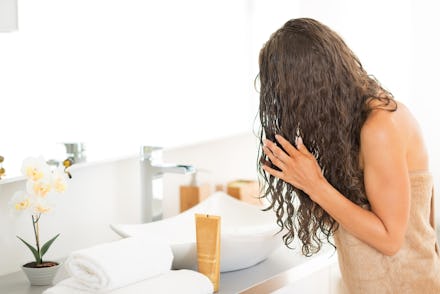Is It Bad to Sleep With Wet Hair? Before You Go to Bed After a Shower, Read This

Have you ever gone to bed with dripping wet hair and wondered whether you were secretly doing damage to your strands? Maybe causing them to thin, or even fall out?
If you're the type of person that showers at night, throws on your pajamas and hops right into bed, you might want to take the extra time to dry it first.
"Sleeping with wet hair doesn't do any particular damage to the hair shafts themselves, but it does make it more likely your hair could be flat, frizzy or generally dull-looking when you wake up," Jessica J. Krant, a cosmetic and medical dermatologist at the Laser & Skin Surgery Center of New York, said in an interview.
Krant explained the outer layer of each hair shaft, or cuticles, are like roof shingles, scaling up in one direction. "When hair is blow dried with gentle smoothing, the shingles all lie flat — as long as there isn't too much heat damage over time from overstyling," she said. When you fall asleep with wet hair, the hairs often press and rub against the pillow case, leaving the cuticles at different angles, and thereby "reducing the reflective shine and seal of any given shaft and making it seem dirtier."
If you're too lazy to wake up early and wash your hair, or lack the time needed to dry it before work, here are some products that might be able to salvage your stands from the effects of a pillow case.
For volume:
A mousse or texturizing powder can give your bedhead a quick lift in the early hours.
For frizzy hair:
With the summer temperatures come beach trips, but also frizz. A touch of cream or serum can tame the flyaways that wet hair (or just the humidity) might've caused.
To add shine:
Looking for the shine that models and Selena Gomez have in hair commercials? Well, sorry, that might not be possible. But a shine oil, mist or spray can minimize dullness and help with the shine that had been reduced overnight.
Or you can just shower at night, rock the frizz and look like this:
Read more: